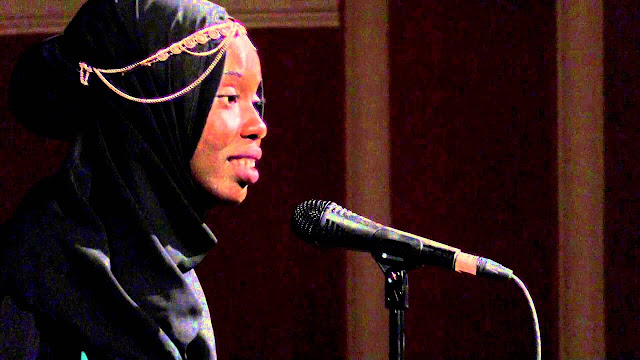When
this blog first took notice of Emi Mahmoud for our National Poetry Month series in 2016
she was a Yale senior who was born
in Darfur in Sudan.
Her
parents were writers who were displaced
by the genocide in that
country. When she was a toddler they fled to Yemen and then to the U.S. in
1998. Her parents worked to raise awareness of the genocide. At first, she told an interviewer for YaleNews,
her parents tried to shield their
children from the grim reality. But she became curious about what they were
doing, “When I insisted they tell me, they did. I just picked up a pen and
started was soon composing verse for the cause.”
Although
she was an experienced writer who had dabbled in poetry, Mahmoud was completely
unfamiliar with the world of spoken
word performance art that had percolated up from coffee houses, smoky saloons,
and even street corners carrying on
the traditions of beat poetry, infused with hip-hop and rap, and the self-conscious avant gurde art scene. It was a poetry alternative to the literary/academic establishment with its little magazines and fading
connections to the broader culture.
It
was somewhat of a struggle for her
to enter that world and to gain
confidence as a live performer. But when she did there was no stopping her. By 2014 she won the crown at the Individual World Poetry Slam Championship
(iWPS). Video of that performance and others went viral.
After
that there was no stopping her. Mahmoud
was on the BBC’s list of The Most Inspirational Women Across the World in 2015, and she was
invited to a 2016 roundtable with President Obama, when he visited the Islamic Society of Baltimore. That same year
she was invited to recite one of her poems at the United Nations General Assembly in New York, launched a campaign at the Laureates and Leaders Summit in New Delhi, and gave a talk at the TEDMED conference.
In
2017 and ‘18, Mahmoud took part in the How
to Do Good speaker tour, performing poetry and discussing her advocacy work in New York, Oslo, Stockholm, The Hague, Brussels, Paris, London, and York in. She was the opening speaker at a TEDxTalk
in Kakuma refugee camp in Kenya in 2018. She remains in demand at
events around the world and has a huge You
Tube following.
Long
interested in health issues including
sickle cell disease, linking her
refugee experience to the Coronavirus
pandemic came naturally.
Mahmoud’s
poetry is best experience in performance.
She Tweeted this about her
participation in a conference on The
Seven Stages of Grief During Coronavirus.
A couple of months
ago, I sat down to write about the pandemic when it was still the most pressing
thing on our minds. I couldn’t shake the feeling that for some of us, crisis is
all too familiar, for some of us, the world has ended many times. It continues
to end every day. That sentiment still rings true today, if anything, it’s even
more appropriate now. And I’m happy to now be bringing this to life through UNHCR [United Nations High Commissioner for Refugees] for World Refugee Day—it’s been an honor to
work on this project with the UN Refugee
Agency.
There is no
alternative but to decide to care, there is no alternative but to decide to do
our absolute best in changing our world for the better in every way possible
and that starts with centering the people most affected in our push against
disparity, inequality, oppression, and violence in all its forms. In America
that looks like standing up for black people and standing up against injustice,
and refugees are included in that sentiment in every way. What does it look
like where you are? And how will you include #refugees ? Sending love and joy and the hope and the dream—the
goal, that we carry one another through this.
I hope this inspires you, I hope it offers solace, I hope it drives you
to support the most vulnerable people, wherever they may be, this world refugee
day and every day after ❤️ finding strength in solidarity #withrefugees
#WorldRefugeeDay.
Here is the video she made for that occasion.



No comments:
Post a Comment